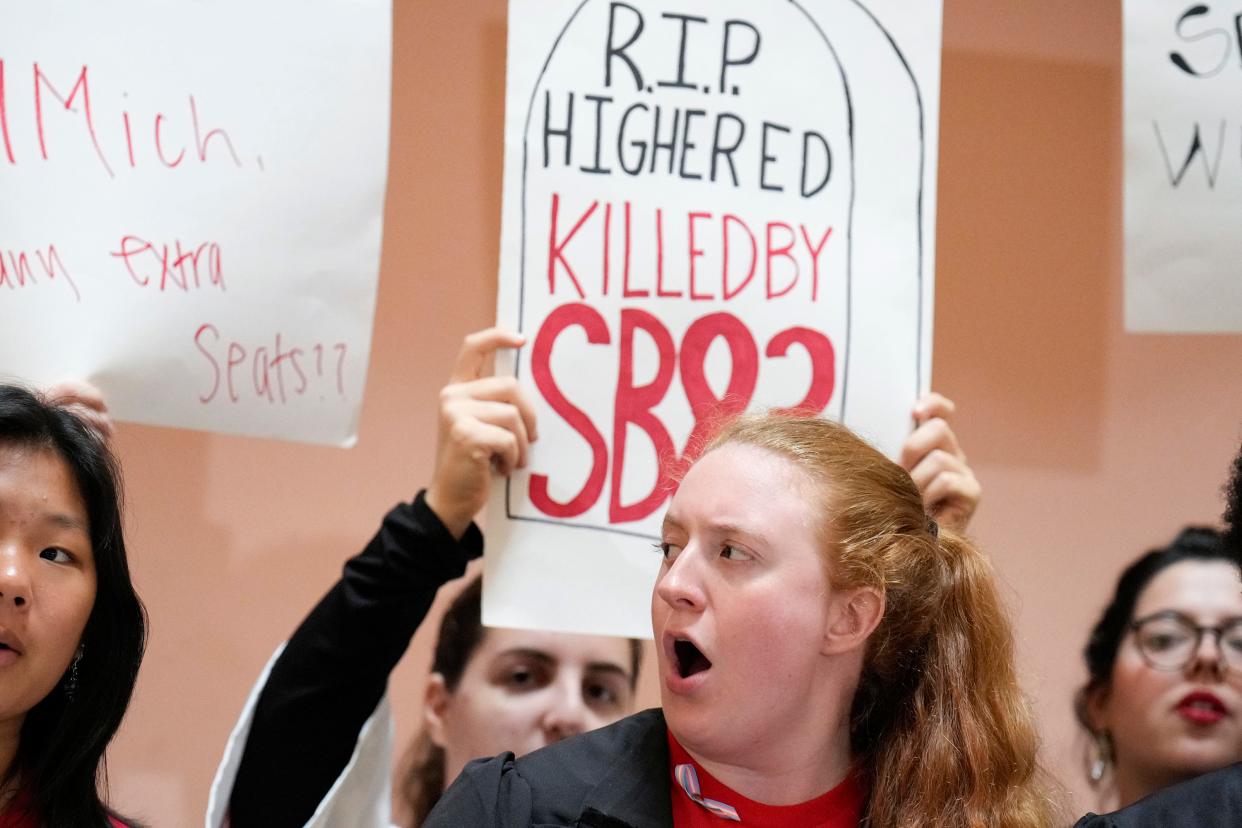Ohio Senate passes budget. What does it mean for education, taxes and other issues?

- Oops!Something went wrong.Please try again later.
- Oops!Something went wrong.Please try again later.
Senate Republicans passed a "transformational" state budget Thursday over objections of Democrats who said they couldn't overlook Republican plans to combat perceived liberal bias on Ohio's college campuses, reduce increases for subsidized childcare and make all students eligible for school vouchers.
The budget, which lays out how Ohio will spend about $173 billion over the next two fiscal years, passed 24-7. Every Democrat voted no, and two Republicans were absent. That's a big difference from what happened in the Ohio House in April. Nearly all that chamber's Democrats voted for that version of the state spending plan.
Senate President Matt Huffman, R-Lima, told reporters he decided to go in a more conservative, policy-driven direction centered around tax cuts and education reforms.
"This is a solid conservative budget," Huffman said Thursday. "The House has 67 Republicans there. It's likely that all other things being equal if it was a normal course that there would probably be 50 votes for it."
He acknowledged that's not likely to happen, though, and expects to spend the next two weeks hashing out a final version to give Gov. Mike DeWine.
Senate Democrats slammed the budget plan.
"We chose not to offer any amendments because, to us, this bill is so fundamentally and foundationally flawed that no floor amendment was going to redeem it," Minority Leader Nickie Antonio, D-Lakewood, said.
Here are some of the key highlights of the Senate budget plan.
Public education overhaul
Ohio's K-12 public schools would get a $1.3 billion increase under the Senate's plan, but that was about $541 million less than the House proposed.
Instead, the Senate expanded eligibility for Ohio's EdChoice scholarships to every student on a sliding scale basis, where children whose parents earn more receive smaller amounts.

"We wanted to provide parents throughout the entire state the opportunity to decide for themselves where their child should be educated," Finance Chair Sen. Matt Dolan, R-Chagrin Falls, said. "Like the governor, like the House, we've expanded school choice. Unlike them, we have said that choice belongs to everyone."
Republicans also added Senate Bill 1, which would put the governor's office in charge of K-12 education by making the Department of Education's director a cabinet appointee. The State Board of Education elects the department's current leader.
Also added to the budget plan was Senate Bill 83, which would prohibit most mandatory diversity, equity and inclusion training, give greater oversight to partnerships with Chinese universities, restrict the kinds of public positions public colleges and universities could take, penalize teachers who fail to create classrooms "free from bias," and ban professors from striking.
"This is bad for education and bad for Ohio," Sen. Kent Smith, D-Euclid, said. "The anti-strike provisions make it the worst attack on collective bargaining this chamber has seen since Senate Bill 5 in 2011."
Tobacco, TikTok and working from home
In addition to deciding how to spend Ohio's general revenue fund, the Senate plan would ban the sale or distribution of flavored vaping products except menthol.
That's a restriction DeWine has wanted for years, but the last effort came with a prohibition on local governments such as Columbus regulating tobacco more strictly than the state − something the governor vetoed in 2022.

This budget would also ban the use of TikTok and other Chinese apps on state government devices and require state employees to work from their offices four days per week.
"I believe and the Senate believes that you do more work, you do more effective work when you're physically present at your workplace," Huffman said.
Tax cuts
The latest version of the Senate's budget bumped an overall tax cut up to $3.1 billion and included a business tax cut that will eliminate the Commercial Activities Tax for 90% of the companies who pay it.
"As I said early on, the Senate's focus is returning money to taxpayers, and that means small businesses, that means all levels of income," Dolan said.
All Ohioans who pay income taxes would get an income tax reduction, and there would be a new sales tax holiday in August 2024 for most tangible items that cost less than $500.
New rules for teenagers on social media
Teens younger than 16 would have to get parental approval before creating new social media accounts, as the budget included provisions for companies like Facebook and Snapchat to verify the age of new users.
That's another item DeWine has been pushing for in this budget.
But when those children turn 18, the Senate's budget would allow them to become police officers. The provision was added Wednesday afternoon and would allow (but not require) departments to lower their minimum age for serving from 21 to 18.
Opponents, which include some statewide police organizations, aren't convinced that this is a good solution to their staffing problems.
"We do not feel teenagers have the maturity and experience to handle the oftentimes complex and life-altering calls officers face daily," said Mike Weinman, the director of governmental affairs for Ohio's Fraternal Order of Police in March.
Big changes for public benefits
The House wanted to spend about $4.2 million covering the school breakfasts and lunches for students who qualify for a reduced rate, but the Senate nixed that idea.
Republicans in the Senate also decided not to go with the governor and House on the increase in income eligibility for publicly funded childcare, saying capacity is already an issue at many of these daycares.
"We did provide (federal COVID relief) dollars for building out daycares and hope to expand that as we go forward," Dolan said. "But having enough spots is the problem right now that we have to address."
Proposed work training for people who receive Supplemental Nutrition Assistance was scrapped on Wednesday, but the Senate added a new rule that Ohio's benefit debit cards have a photo of the recipient (or one recipient from the household).
The Senate did restore money the governor requested for an affordable housing credit.
Anna Staver is a reporter for the USA TODAY Network Ohio Bureau, which serves the Columbus Dispatch, Cincinnati Enquirer, Akron Beacon Journal and 18 other affiliated news organizations across Ohio.
This article originally appeared on The Columbus Dispatch: 'Historic' education changes inside budget as Senate votes

